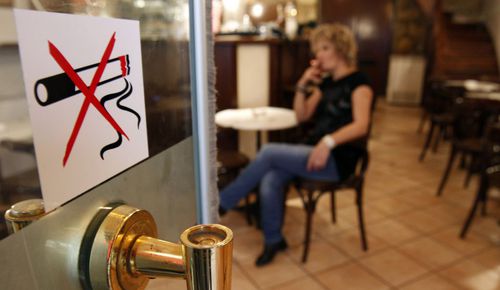Coffee and Cigarettes
Austrian Politics and the smoking ban

Being a huge fan of Jim Jarmusch movies, if I had to point out one, it would definitely be Coffee & cigarettes. Whether you are into pop culture, artistic movies or into the coffee and smoking lifestyle, this is the movie for you. Just like in real life, it brought together people that shared similar but also less similar interests, ranging from the legendary musicians Iggy Pop and Tom Waits to actor Bill Murray and the rap group Wu Tang Clan. Some of the conversations went well, some didn’t but I won’t go on because it would contain spoilers.
In Europe nowadays, if you would like to have an indoor coffee and a smoke, it is definitely a mission impossible. Rare EU countries have not implemented the ban, as the numbers rose significantly since Ireland pioneered the smoking ban, back in 2004. The country I will focus on today is Austria, having in mind a much wider political issue than just health concerns and damage. When I came to Austria as a student, which is now already some 5-6 years ago, I was amazed to see a progressive EU country where you could have your coffee and a meal while enjoying a smoke indoors.
I was told it was an Austrian tradition, and that the country is relatively liberal on that issue (It was legal to smoke when you’re 16). Basically, smoking was very much encouraged, especially having in mind that the Austrian youth was statistically ranking high on that issue. Not to mention that the cigarette vending machines were available throughout Austria. However, around the time I was finishing my studies, the previous centrist coalition of the centre-left social democratic SPO and the centre-right people’s party OVP introduced a smoking ban proposal, which would be implemented in 2018. When I heard the news, I already started joking with my friends that our study era there would also be remembered by bars where you could smoke inside. However, in the meantime many things happened, and the Austrian elections were the cherry on top.
The story is well-known, the Austrian People’s Party candidate Sebastian Kurz won the elections on a tough migration stance, but was forced to go into a coalition with the Freedom Party of Austria (FPO) which reached its peak and figured out that they had enough of opposition life. This marriage of right-wing convenience was negotiated rather quickly, especially compared to neighboring Germany, and included a comprehensive agreement. As part of the agreement, the FPO demanded from OVP to revoke the smoking ban and to maintain the status quo, while making cosmetic changes that the legal smoking age will rise from 16 to 18. Chancellor Sebastian Kurz was forced to change his previous agenda on the topic.
The media have often written on the topic, emphasizing how FPO leader Heinz-Christian Strache is a notorious smoker, while Sebastian Kurz does not even touch coffee. For this topic, that is as relevant as asking if they prefer pizza or pasta. The context is much deeper, as FPO tries to maintain this image of combining national populism with strong welfare policies, and defines itself as being the soziale Heimatspartei, which could be translated as a socially aware homeland party. They try to argue their opposition for the ban by stating that many workers would lose their job if the ban were to be implemented, that it is a part of Austrian culture, while emphasizing the freedom of choice. Sounds very leftist, right? Far away from it.
The FPO leader held a meeting with restaurant owners, which oppose the ban for obvious reasons, while it would be interesting to hear if he had met with the tobacco lobby. At the same time, health workers are furious with the decision, and more than 400, 000 Austrians have signed the petition against the government decision to revoke the ban. Also, many of them activated themselves due to the animosity towards the current government. Finally, the issue remains emotional for many Austrians, a bigger one than a passive observer would expect, and divides society the same way a choice for a football club does in many EU countries.
From this situation, one can see that the FPO can only function and gain points by polarizing the society, reaching for emotional issues and by constantly provoking. With the backing of the gastronomy lobby and the tobacco industry, they have recognized an issue with which they could play with and attract attention. At the same time, one could conclude that withdrawing the smoking ban is a symbol of many compromises the OVP had to give to the FPO, which is seen especially in the classic FPO topics of security, defense, migration, etc. The question of the day remains, how much more will there be?
